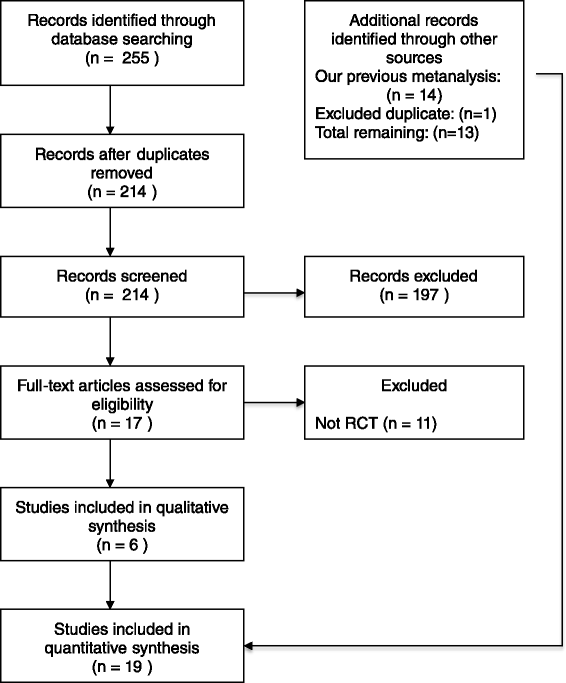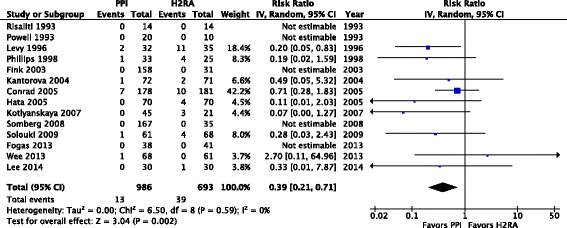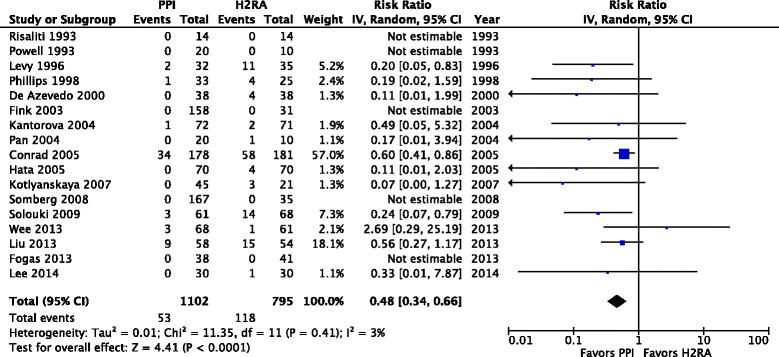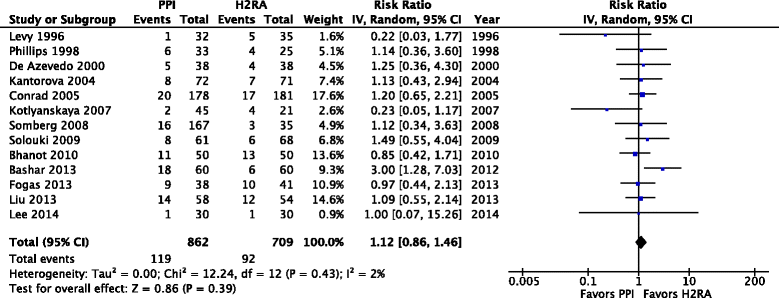Efficacy and safety of proton pump inhibitors for stress ulcer prophylaxis in critically ill patients: a systematic review and meta-analysis of randomized trials
- PMID: 27142116
- PMCID: PMC4855320
- DOI: 10.1186/s13054-016-1305-6
Efficacy and safety of proton pump inhibitors for stress ulcer prophylaxis in critically ill patients: a systematic review and meta-analysis of randomized trials
Abstract
Background: The relative efficacy and safety of proton pump inhibitors (PPIs) compared to histamine-2-receptor antagonists (H2RAs) should guide their use in reducing bleeding risk in the critically ill.
Methods: We searched the Cochrane library, MEDLINE, EMBASE, ACPJC, clinical trials registries, and conference proceedings through November 2015 without language or publication date restrictions. Only randomized controlled trials (RCTs) of PPIs vs H2RAs for stress ulcer prophylaxis in critically ill adults for clinically important bleeding, overt gastrointestinal (GI) bleeding, nosocomial pneumonia, mortality, ICU length of stay and Clostridium difficile infection were included. We used the Grading of Recommendations Assessment, Development and Evaluation (GRADE) approach to assess our confidence in the evidence for each outcome.
Results: In 19 trials enrolling 2117 patients, PPIs were more effective than H2RAs in reducing the risk of clinically important GI bleeding (RR 0.39; 95 % CI 0.21, 0.71; P = 0.002; I (2) = 0 %, moderate confidence) and overt GI bleeding (RR 0.48; 95 % CI 0.34, 0.66; P < 0.0001; I (2) = 3 %, moderate confidence). PPI use did not significantly affect risk of pneumonia (RR 1.12; 95 % CI 0.86, 1.46; P = 0.39; I (2) = 2 %, low confidence), mortality (RR 1.05; 95 % CI 0.87, 1.27; P = 0.61; I (2) = 0 %, moderate confidence), or ICU length of stay (mean difference (MD), -0.38 days; 95 % CI -1.49, 0.74; P = 0.51; I (2) = 30 %, low confidence). No RCT reported Clostridium difficile infection.
Conclusions: PPIs were superior to H2RAs in preventing clinically important and overt GI bleeding, without significantly increasing the risk of pneumonia or mortality. Their impact on Clostridium difficile infection is yet to be determined.
Figures




References
-
- Skillman JJ, Silen W. Acute gastroduodenal “stress” ulceration: barrier disruption of varied pathogenesis? Gastroenterology. 1970;59(3):478–82. - PubMed
-
- Cook D, Heyland D, Griffith L, Cook R, Marshall J, Pagliarello J. Risk factors for clinically important upper gastrointestinal bleeding in patients requiring mechanical ventilation. Canadian Critical Care Trials Group. Crit Care Med. 1999;27(12):2812. doi: 10.1097/00003246-199912000-00034. - DOI - PubMed
Publication types
MeSH terms
Substances
LinkOut - more resources
Full Text Sources
Other Literature Sources

